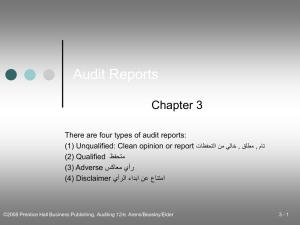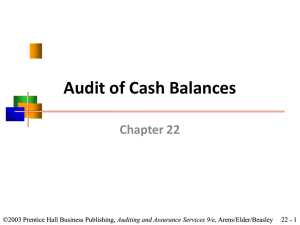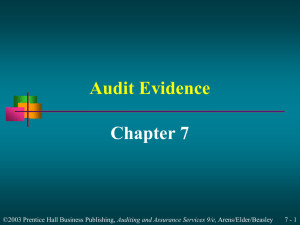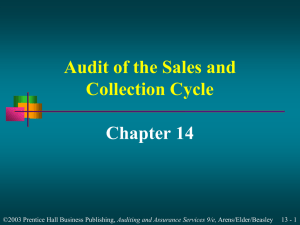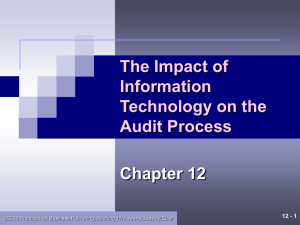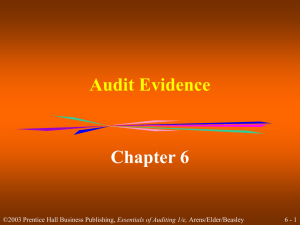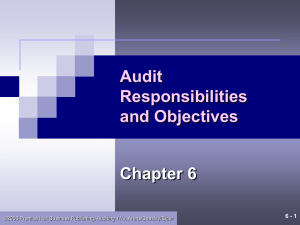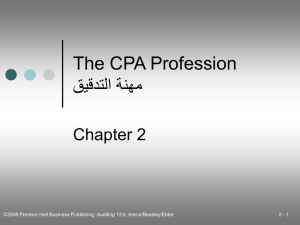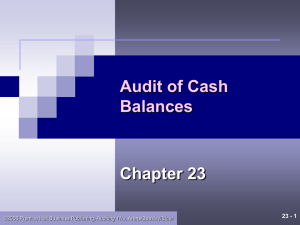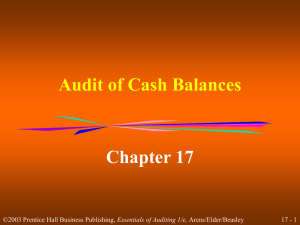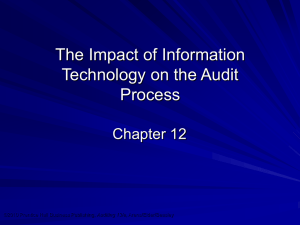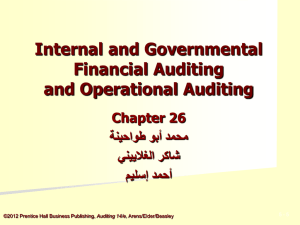Chapter 3 – Audit Reports
advertisement
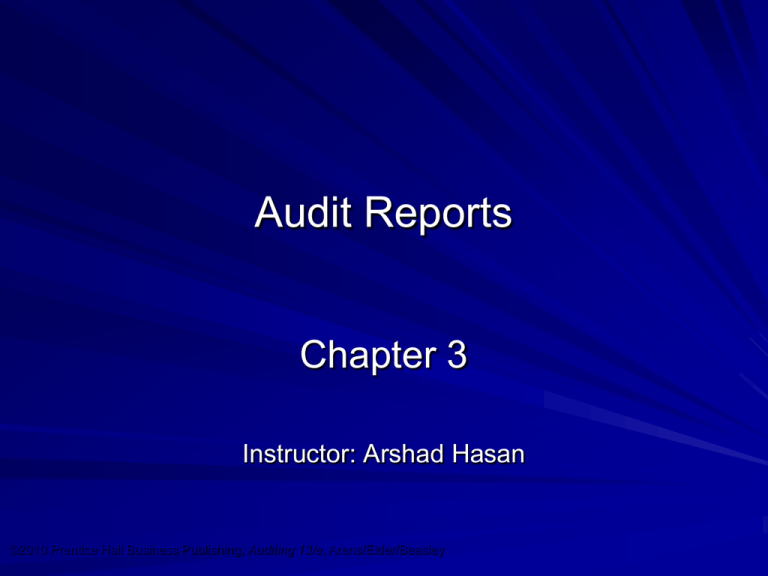
Audit Reports Chapter 3 Instructor: Arshad Hasan ©2010 Prentice Hall Business Publishing, Auditing 13/e, Arens/Elder/Beasley 3-1 Parts of the Standard Unqualified Audit Report 1. Report title 2. Audit report address 3. Introductory paragraph 4. Scope paragraph 5. Opinion paragraph 6. Name of CA firm 7. Audit report date ©2010 Prentice Hall Business Publishing, Auditing 13/e, Arens/Elder/Beasley 3-2 Four Categories of Audit Reports 1. Standard unqualified 2. Unqualified with explanatory paragraph or modified wording 3. Qualified 4. Adverse or disclaimer ©2010 Prentice Hall Business Publishing, Auditing 13/e, Arens/Elder/Beasley 3-3 Conditions for Standard Unqualified Audit Report 1. All financial statements are included. 2. The three general standards have been followed in all respects on the engagement. (Proficiency, Independence, Professional Care) 3. Sufficient evidence has been accumulated to conclude that three standards of field work have been met. (Planning, Understanding, Audit Evidence) 4. The financial statements are presented in accordance with IFRS / generally accepted accounting principles. 5. There are no circumstances requiring the addition of an explanatory paragraph / modification of wording of report. ©2010 Prentice Hall Business Publishing, Auditing 13/e, Arens/Elder/Beasley 3-4 Unqualified Report with Explanatory Paragraph 1. Lack of consistent application of generally accepted accounting principles / IFRS 2. Substantial doubt about going concern 3. Auditor agrees with a departure from promulgated accounting principles 4. Emphasis of a matter 5. Reports involving other auditors ©2010 Prentice Hall Business Publishing, Auditing 13/e, Arens/Elder/Beasley 3-5 Substantial Doubt About Going Concern 1. Significant recurring operating losses or working capital deficiencies. 2. Inability of the company to pay its obligations as they come due. 3. Loss of major customers, the occurrence of uninsured catastrophes. 4. Legal proceedings, legislation that might jeopardize the entity’s ability to operate. ©2010 Prentice Hall Business Publishing, Auditing 13/e, Arens/Elder/Beasley 3-6 Auditor Agrees with a Departure from a Promulgated Principle The auditor must be satisfied and must state and explain, in a separate paragraph or paragraphs in the audit report, that adhering to the principle would have produced a misleading result in that situation. ©2010 Prentice Hall Business Publishing, Auditing 13/e, Arens/Elder/Beasley 3-7 Emphasis of a Matter Under certain circumstances, the CA may want to emphasize specific matters regarding the financial statements, even though the CA intends to express an unqualified opinion. 1. 2. 3. 4. Existence of significant related party transactions Events occurring subsequent to balance sheet date Matters affecting comparability of financial statements Material uncertainties disclosed in footnotes ©2010 Prentice Hall Business Publishing, Auditing 13/e, Arens/Elder/Beasley 3-8 Reports Involving Other Auditors 1. Make no reference in the audit report 2. Make reference in the report (modified wording report) 3. Qualify the opinion ©2010 Prentice Hall Business Publishing, Auditing 13/e, Arens/Elder/Beasley 3-9 Departures from An Unqualified Opinion 1. Scope limitation 2. GAAP departure 3. Auditor not independent ©2010 Prentice Hall Business Publishing, Auditing 13/e, Arens/Elder/Beasley 3 - 10 Qualified Opinion A qualified opinion report can result from a limitation on the scope of the audit or failure to follow generally accepted accounting principles. ©2010 Prentice Hall Business Publishing, Auditing 13/e, Arens/Elder/Beasley 3 - 11 Adverse Opinion It is used only when the auditor believes that the overall financial statements are so materially misstated or misleading that they do not present fairly the financial position or results of operations and cash flows in conformity with GAAP. ©2010 Prentice Hall Business Publishing, Auditing 13/e, Arens/Elder/Beasley 3 - 12 Disclaimer of Opinion It is issued when the auditor is unable to be satisfied that the overall financial statements are fairly presented. ©2010 Prentice Hall Business Publishing, Auditing 13/e, Arens/Elder/Beasley 3 - 13 Reporting on Internal Control over Financial Reporting Auditors of public companies subject to Section 404 of the Sarbanes-Oxley Act must report on the effectiveness of internal control over financial reporting. PCAOB Auditing Standard 5 requires the audit of internal control to be integrated with the audit of the financial statements. ©2010 Prentice Hall Business Publishing, Auditing 13/e, Arens/Elder/Beasley 3 - 14 Sarbanes-Oxley Act Separate Report on Financial Statements and Internal Control Over Financial Reporting 1. Introductory paragraph 2. Scope paragraph 3. Definition paragraph 4. Inherent limitations paragraph 5. Opinion paragraph 6. Cross Reference Paragraph ©2010 Prentice Hall Business Publishing, Auditing 13/e, Arens/Elder/Beasley 3 - 15 Materiality A misstatement in the financial statements can be considered material if knowledge of the misstatement would affect a decision of a reasonable user of the statements. ©2010 Prentice Hall Business Publishing, Auditing 13/e, Arens/Elder/Beasley 3 - 16 Levels of Materiality Amounts are immaterial. Amounts are material but do not overshadow the financial statements as a whole. Amounts are so material or so pervasive that overall fairness of the statements is in question. ©2010 Prentice Hall Business Publishing, Auditing 13/e, Arens/Elder/Beasley 3 - 17 Relationship of Materiality to Type of Opinion Materiality Significance in Terms of Type of Level Reasonable Users’ Decisions Opinion Users’ decisions are unlikely Immaterial to be affected. Unqualified Material Users’ decisions are likely to be affected. Qualified Highly material Users’ decisions are likely to be significantly affected. Disclaimer or adverse ©2010 Prentice Hall Business Publishing, Auditing 13/e, Arens/Elder/Beasley 3 - 18 Materiality Decisions Dollar amount compared with a base Measurability Nature of the item ©2010 Prentice Hall Business Publishing, Auditing 13/e, Arens/Elder/Beasley 3 - 19 Proposed use of international accounting and auditing standards by U.S. companies Globalization of world’s capital markets are leading to calls for a single set of accounting standards to be used around the world. The SEC has a proposed roadmap that could lead to the use of IFRS by U.S. public companies beginning in 2014 ©2010 Prentice Hall Business Publishing, Auditing 13/e, Arens/Elder/Beasley 3 - 20 End of Chapter 3 ©2010 Prentice Hall Business Publishing, Auditing 13/e, Arens/Elder/Beasley 3 - 21
